IRGC Says New Military Vessels Added To Navy Fleet
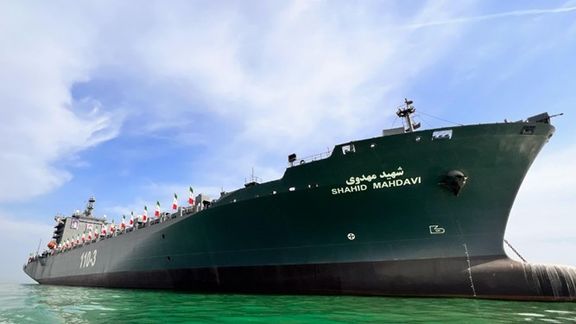
Iran’s Revolutionary Guard Corps navy announced it has added a new ocean-going warship and tens of missile-launching speed boats to its fleet.

Iran’s Revolutionary Guard Corps navy announced it has added a new ocean-going warship and tens of missile-launching speed boats to its fleet.
The vessels were part of a major upgrade, bolstering the country's navy fleet in the midst of the worst recession in recent history.
The IRGC held an unveiling ceremony in the port city of Bandar Abbas on Thursday but did not declare how much the project had cost.
The Iranian-made Shahid Mahdavi warship, converted from a commercial vessel, will take center stage in the fleet’s renewal, along with 99 Ashura and Tariq speed boats, which have been upgraded from rocket-launching vessels to missile-launching ones.
The bolstering of the fleet comes amidst growing tensions between Iran and its arch enemy Israel. Iran has been claiming to have deployed more weapons and radars following threats from Israel which says that military force has not been ruled out, while Iran continues expanding its nuclear weaponry.
“The Mahdavi ocean-going vessel is ready to carry out missions with all the necessary equipment and facilities to create stable security in the seas,” said IRGC Navy commander Alireza Tangsiri.
According to Tangsiri, the 2100 ton Shahid Mahdavi, which measures 240 meters in length and 27 meters wide, is equipped with a 3D phased array radar, surface-to-surface and surface-to-air missiles, and highly advanced telecommunication systems.
It is capable of carrying helicopters, UAVs, missile launchers, as well as missile defense and radar systems.
He added that the range of missiles on the speed boats is between 10 and 180 kilometers, and according to him, this is the first time that such vessels have been designed with this feature.
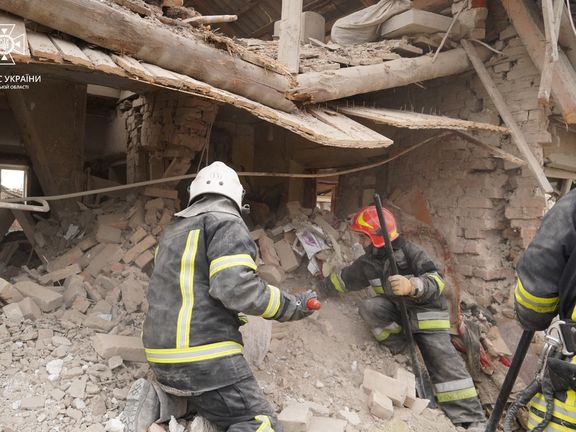
Russia unleashed a large-scale missile and drone attack on Ukraine Thursday morning targeting energy infrastructure and killing at least six people.
According to the Ukrainian military, Russia used 81 missiles and eight Iranian-made Shahed kamikaze drones in the attack.
The attacks were mainly on energy facilities and hit more than half a dozen regions, striking the capital Kyiv, the Black Sea port of Odesa and the second-largest city Kharkiv.
Ukraine's military said air defenses knocked out at least 34 missiles and four Shahed suicide drones, but regional officials said five people were killed in the western region of Lviv and one in southeastern Dnipropetrovsk in southeastern Ukraine.
"This was a major attack and for the first time with so many different types of missiles...The enemy launched six Kinzhals," air force spokesperson Yuriy Ihnat said. "It was like never before."
Iran has supplied hundreds of Shahed and other drones to Russia since mid-2022, and although Ukraine is capable of shooting down most of the slow-moving UAVs, Russia relies on the Iranian weapon to swarm Ukraine’s air defenses.
The United States and its European allies have imposed a series of sanctions on Iranian individuals and companies involved with the drone program and shipments of the weapon to Russia. They have also warned Tehran that one of the conditions to restart nuclear talks is ending its weapons supplies to Russia. A nuclear agreement between Iran and West could suspend most economic sanctions and boost the country’s economy.

Amid global events marking International Women's Day, right groups and organizations have called for investigations into chemical attacks on Iranian schoolgirls.
In a tweet on Wednesday, UNESCO urged thorough investigations and immediate actions to protect schools and facilitate the return of affected students in Iran to their safe and healthy classrooms. UNESCO Director-General Audrey Azoulay expressed deep concern “about the reported poisoning of schoolgirls in Iran over the past three months,” describing the attacks as “a violation of their right to safe education.”
Demonstrators on the International Women's Day in many countries called for solidarity with women's rights protests in Iran as well as with Afghanistan’s girls who are banned from education. In cities, including Berlin, Cologne, Paris and several others, people carried banners in support of the “Women, Life, Freedom” movement in Iran, the antigovernment protests ignited by the death in custody of 22-year-old Iranian woman Mahsa (Zhina) Amini in September.
While the Islamic Republic has been fiercely cracking down on dissent and seems to be involved in serial chemical attacks on schoolgirls that have reportedly affected thousands of students, activists and right groups have called on the international community to pressure the regime over the issue.
Dozens of Iranian women activists and lawyers have launched a petition, calling for the formation of a crisis management taskforce comprised of independent doctors, lawyers and experts as well as parents of the affected students to investigate the poisoning.
The petition said that during the past three months of attacks, more than 2,000 students have been affected with many hospitalized, claiming that these are undoubtedly an orchestrated operation to terrorize society.
In a separate open letter issued on Wednesday, a group of prominent Iranian and Afghan female activists called on the world to hold the Islamic Republic accountable for the attacks and help to end them. They urged governments to acknowledge “the gender apartheid” in Iran under the Islamic Republic and Afghanistan under Taliban.
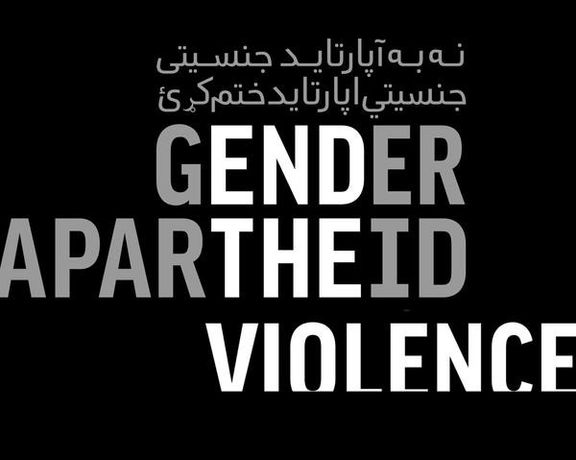
The signatories, which include opposition figures such as Iranian Nobel Peace Prize Laureate Shirin Ebadi and activist Masih Alinejad and Afghan activist Fawzia Koofi, said in their letter, "Looking at the example of condemnation of apartheid in South Africa by the international community, women living in Iran and Afghanistan are demanding similar responses to end these gender apartheid regimes."
They emphasized that the rights violations by the Islamic Republic and the Taliban are not limited to cases of gender discrimination, but these governments have waged a "more extreme, systematic and structural war" against women to suppress them. In addition to support from the international community, they want the world to criminalize “gender apartheid” in Iran and Afghanistan according to international conventions.
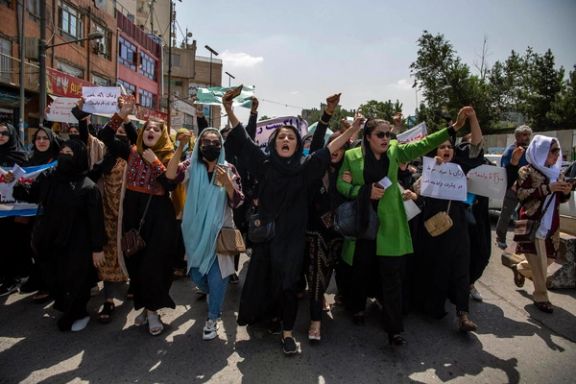
Foreign governments and officials have been vocal about the mass poisonings and other women’s rights violations by the Islamic Republic and Taliban. In a statement on International Women’s Day, US President Joe Biden said, “Despite decades of progress, in far too many places around the world, the rights of women and girls are still under attack, holding back entire communities. We see it in Afghanistan, where the Taliban bars women and girls from attending school and pursuing employment. We see it in Iran, where the regime is brutally repressing the voices of women who are courageously standing up for their freedom.”
The UK and the US, the European Union, and Australia issued sanctions on the Islamic Republic to mark International Women's Day. The UK targeted global violators of women’s human rights, including Iran's morality enforcing outfit and its top official, while the US imposed sanctions on Iranian officials and companies over serious human rights abuses.
Also on Wednesday, Member of the European Parliament Hannah Neumann said the Parliament will debate the poisoning of schoolgirls in Iran Wednesday next week, followed by a resolution, adding, “This provides another important opportunity to raise awareness about the repression in the country -- and the brave opposition to it.”
On Tuesday, 20 prominent Iranian lawyers and human rights advocates has issued a joint letter, calling on the WHO, the UNESCO, the UNICEF and the International Committee of the Red Cross to immediately visit Iran and probe into the serial poisoning of schoolgirls.
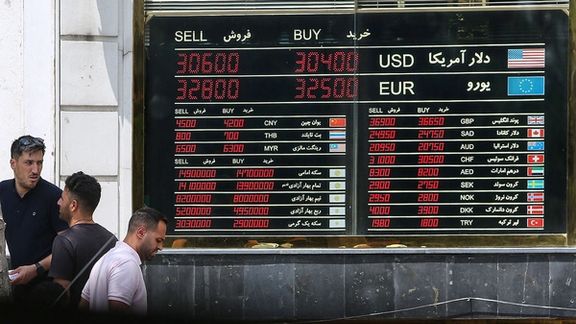
Iran's former ambassador to Japan, Canada and the UK says the Islamic Republic conducts foreign trade via international smuggling and money laundering networks.
Amid a deep economic crisis, commentaries about the impact of foreign policy, meaning isolation and sanctions, on the country’s well-being have become more frequent.
Mohammad Hossein Adeli told Ham-Mihan Daily that by using these networks, Iran circumvents US sanctions. "As long as we are doing this, our situation is not normal. This is a costly way that entails high inflation for Iran."
Adeli who was the governor of Iran's Central Bank under President Akbar Hashemi Rafsanjani and the country's ambassador to several key countries under the reformist government of President Mohammad Khatami, said Iran is a country that cannot remain isolated.
He maintained that although some “revolutionaries” advocate isolation as a way of growth, they need to know that even China owes its growth to foreign investment and a $760 billion per annum trade with the United States. Adeli added that "isolation will drag Iran into collapse and instability and its economic development depends on national power and stable and intelligent interaction with the world. That is how China, India, Indonesia, Brazil, South Africa and Vietnam have successfully survived and their economies grew."
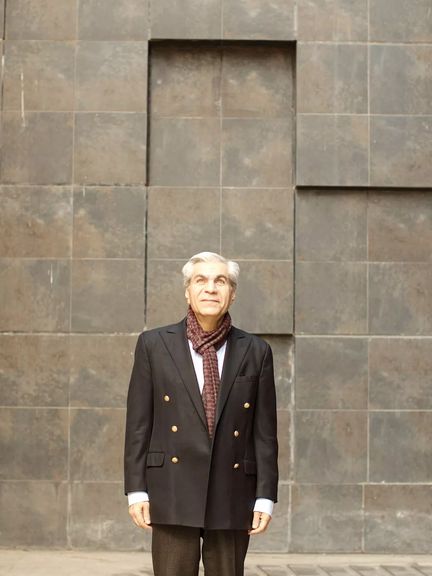
Adeli further stressed that economic sanctions cause a bigger loss for Iran than any war. He added that Iran is under the pressure of a series of deep and complicated sanctions. The added cost of domestic and international trade under sanctions disrupts Iran's economy and increases the cost of everything.
"People are in trouble for their everyday livelihood and the country cannot develop. When there is no prospect for future, people lose their hope. As a result, law breaking becomes a norm and social relations are disrupted. That, eventually causes revolt in the country," Adeli said.
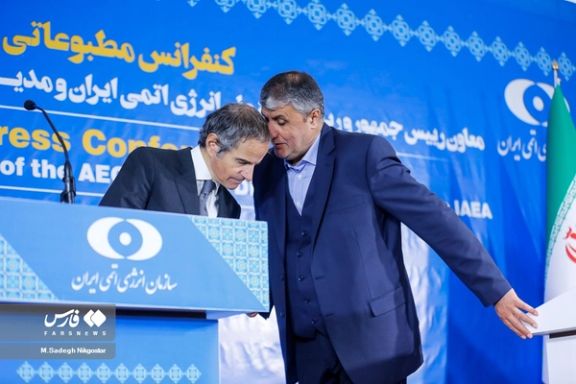
Meanwhile, a commentary in the moderate news website Faraz daily maintained that IAEA Director General Rafael Grossi's visit to Tehran quickly helped Iran’s currency to rise after the media quoted a few lines from his statement about agreement over cooperation. The commentary asked whether this would bring the government in Tehran to its senses and encourage it to recognize the link between foreign policy and people's livelihood.
According to Faraz Daily, this development clearly highlighted the importance of foreign policy on the country's economy, while Iranian officials have been insisting that their isolationist foreign policy has no impact on the people's livelihood.
At the same time, the commentary observed, that not interacting with the world during several years of economic sanctions has led to a crisis for Iran's people and government.
There are indications that at least some politicians in Iran who are usually trusted by Supreme Leader Ali Khamenei are encouraging the government, and in fact Khamenei, who single-handedly makes all decisions on all matters including the economy and foreign policy, to be more flexible in their interactions with the West and particularly the United States.
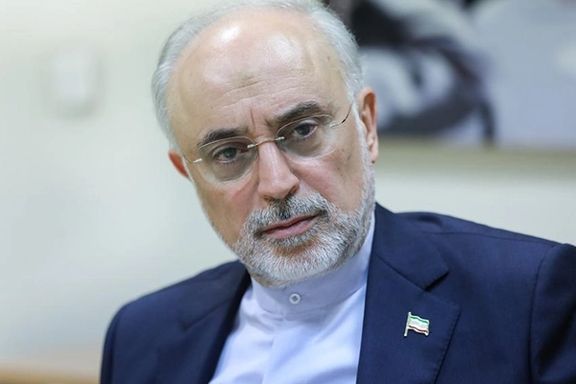
Iran's former nuclear chief Ali Akbar Salehi said on Tuesday that Iran should show flexibility in its negotiations with the West in order to end its international isolation.
Salehi said during a speech at the Iranian Foreign Ministry, "Resistance should come along with prudence. When we face serious obstacles, we need to show intelligent flexibility in order to end our isolation." This, Salehi said, is a wise reaction. He also warned Iranian diplomats, "not to create political or diplomatic deadlocks."
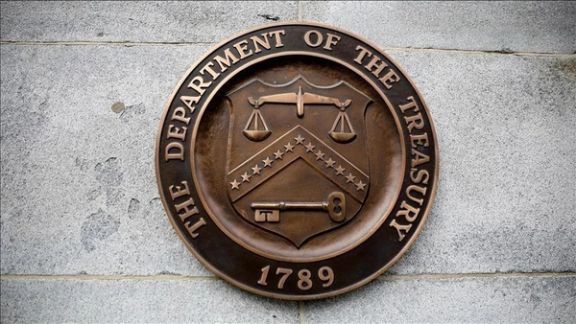
The United States Wednesday imposed sanctions on Iranian officials and companies over serious human rights abuses, stepping up pressure on Tehran over its crackdown on protests.
The US action came in concert with the European Union, Britain and Australia to mark International Women's Day.
The US Treasury Department in a statement said it imposed sanctions on two senior Iranian prison officials it accused of being responsible for serious human rights abuses against women and girls.
Washington also put sanctions on Iran's top army commander, a senior official in the Islamic Revolutionary Guard Corps and an official tied to the Iranian government's efforts to block internet access. Also hit with sanctions were three Iranian companies and their leaders who have enabled law enforcement repression, according to the statement.
The step marks the 10th round of such US sanctions since Tehran's crackdown on protests that began after 22-year-old Mahsa Amini died in September in the custody of the morality police.
The protests by Iranians from all walks of life mark one of the boldest challenges to the ruling theocracy since the 1979 Islamic Revolution.
"The United States, along with our partners and allies, stand with the women of Iran, who advocate for fundamental freedoms in the face of a brutal regime that treats women as second-class citizens and attempts to suppress their voices by any means," US Under Secretary of the Treasury for Terrorism and Financial Intelligence Brian Nelson said in the statement.
"We will continue to take action against the regime, which perpetuates abuse and violence against its own citizens -especially women and girls," Nelson added.
Wednesday's move freezes any US assets of those targeted and generally bars Americans from dealing with them.
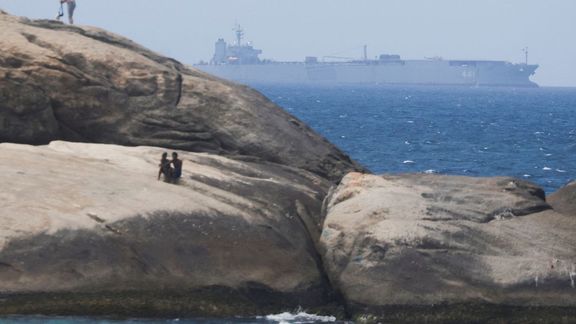
The Islamic Republic’s activities in the Americas have stirred new concerns amidst the recent landing of its warships in Brazil, making Iran’s presence a little too close for comfort to the Biden administration.
The international community hoped the US to invoke consequences to the evident show of force from Iran, using The Monroe Doctrine, a foreign policy position from the first half of the 19th century, stating that any intervention in the political affairs of the Americas by foreign powers is considered a potentially hostile act against the United States.
Over almost two centuries, the doctrine has protected the US from unwanted foreign influence in the region. Most recently, it was invoked in the 1962 Cuban missile crisis when Kennedy gave an ultimatum to the Soviets to pull out their missiles. Experts wonder if such a historic foreign policy principle could be the answer to the threat of Iranian encroachment.
When asked about the US stance on the matter, US State Department spokesman Ned Price said the Doctrine was merely “a legacy of history”, but admitted Iran’s presence so close to home was of grave concern.
“A country like Iran poses a collective threat to the United States and to our partners in this hemisphere. It is our intention to work collaboratively with our partners in the region but even closer to this neighborhood on those types of threats,” he said.
With Brazil refusing to join the US in sanctioning Iran, dating back to 2010, options are running out as to how one of the world’s biggest powers, can fight the threat of Iran looming closer to its shores with a lack of legal mechanisms in place.
The spokesperson said Brazil is “a close democratic partner of the United States,” despite a turbulent history between the two nations, suggesting the docking was not a welcome move for the Brazilian government and that the two sides were coordinating on the issue.
“It’s our impression that no democracy in this hemisphere or anywhere else would want these kinds of Iranian assets, these warships docking in their ports,” he said. "Warships like this have no place in the Western Hemisphere, given the signal it sends.”
Of further concern is the fact that the warships docked in Rio de Janeiro are in fact designated.
“They [Brazil], I am confident, are aware of existing sanctions authorities,” said Price. “We are going to do what is most effective together in pushing back on the threat and the challenge that Iran poses.”
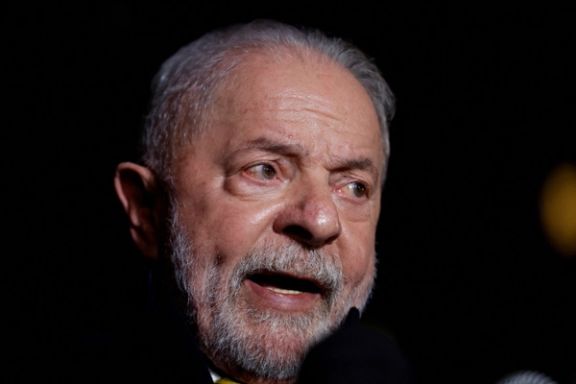
President Luiz Inacio Lula da Silva's government was urged by the Biden administration to send the warships -- IRIS Makran and IRIS Dena -- away in January, but recently bowed to Tehran, allowing them to dock in February.
The presence of the Islamic Republic in Latin America has been a growing concern for the US in recent years with several Congressional reports presented in different Senate and House committees detailing Iran’s influence in the region.
It has been one of a number of issues causing a rift between the US and its neighbors, not least, Brazil. In a Senate Foreign Relations Committee hearing in 2012, Bob Menendez (D-NJ) said that within four years of Ahmadinejad's election in 2005, Iran opened six new embassies in Latin America, including Bolivia, Chile, Colombia, Ecuador, Nicaragua, and Uruguay, in addition to the five embassies Iran already had.
Diplomacy with Iran was one of the highlights of Lula's attempts to bolster Brazil's international standing during his previous presidential terms. He traveled to Tehran to meet then-President Mahmoud Ahmadinejad in 2010 as he sought to broker a nuclear deal between Iran and the United States, Iran and Brazil old allies in the international arena.
During the Trump administration, then-Secretary of State Mike Pompeo time again condemned Iran for its illicit activities in Latin America, describing the regime as “the largest state sponsor of terror” that represents “a global threat”.
On a tour of South American countries in April 2019, Pompeo said in Paraguay that "Iranian money remains in South America ... supporting [Lebanese terror proxy] Hezbollah, supporting transnational criminal organizations, supporting efforts at terrorism throughout the region."
The latest warships’ issue has gained domestic and international condemnation. Senator Ted Cruz called for sanctions against the South American country after the docking, dubbing it "a direct threat to the safety and security of Americans”.
He said the Biden administration is obligated to impose relevant sanctions, re-evaluate Brazil's cooperation with US anti-terrorism efforts, and re-examine whether Brazil is maintaining effective anti-terrorism measures at its ports.
In Israel, Lior Haiat, spokesperson for Israel's Foreign Ministry, called the Brazilian berth for the warships "a dangerous and regretful development”.
Price defended the Brazilian government, however, and said in a press briefing, “It is certainly not the case that the Brazilian government, [or] the Brazilian people would want to do anything that would assist … a regime that is responsible for a brutal crackdown and violent repression against its own people.”